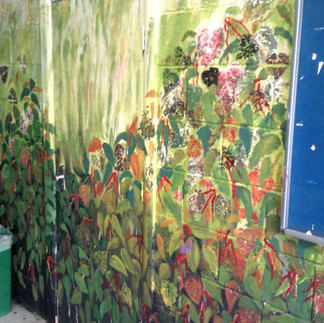HMP Send's horticulture mural
- chris Millin
- Apr 8, 2025
- 2 min read
Horticulture plays a significant role in the rehabilitation program at HMP Send. Inmates have the opportunity to cultivate their own flowers, fruits, and vegetables across 4.5 acres of gardens, 11 poly-tunnels, and a glasshouse. Community Arts Projects UK seized the chance to decorate their workspace, enhancing the agriculture department.

Exploring Nature Through Art: A Transformative Experience for Inmate Students
Our inmate students were presented with a unique opportunity to step outside the confines of their usual environment and immerse themselves in the beauty of nature. This experience allowed them to connect with the world around them in a way that many had not been able to do for quite some time. The fresh air, the sounds of chirping birds, and the vibrant colours of the landscape provided the perfect backdrop for a creative endeavour that would not only engage their artistic skills but also promote emotional healing and personal growth.
During this outdoor session, the students were encouraged to observe and appreciate the natural elements surrounding them. They found inspiration in a variety of subjects, ranging from the delicate flutter of butterflies dancing through the air to the serene presence of birds perched on branches. The students also took notice of the more familiar sights, such as the cats that roamed the grounds, embodying a sense of freedom and curiosity that resonated deeply with them.
In addition to the fauna, the vibrant flora captured their attention as well. The students chose to paint an array of flowers, each with its unique shape, colour, and fragrance, reflecting the diversity of life that exists beyond their daily routines. They also depicted various crops that other prisoners were cultivating, which not only showcased the fruits of their labour but also symbolised hope and renewal. These crops served as a reminder of the potential for growth and transformation, mirroring the personal journeys of the inmate students themselves.
As they painted, the act of creating art became a therapeutic outlet, allowing them to express emotions and thoughts that might have otherwise remained unspoken. The natural setting fostered a sense of peace and tranquility, enabling them to focus on their artistic endeavors without the distractions of their usual environment. This connection to nature and the act of creation provided a powerful means of self-reflection and introspection, encouraging the students to explore their identities and aspirations beyond the walls that confined them. Through this artistic process, the inmate students not only honed their skills but also cultivated a deeper appreciation for the beauty of nature and the importance of self-expression. Their artwork served as a testament to their experiences, emotions, and the transformative power of creativity, illustrating how even in challenging circumstances, one can find solace and inspiration in the world around them.
For more information about HMP Send agriculture program, please visit https://stories.rhs.org.uk/plants-prisons-and-potential/index.html






































Comments